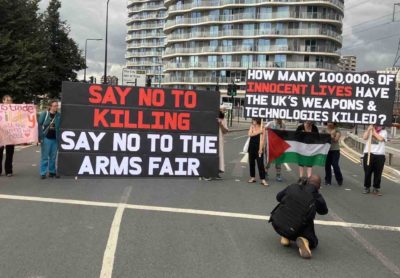Harrogate abuse court martials
Our soldiers deserve first-rate justice
Liberty, 20 March 2018
The UK has two separate justice systems – one for soldiers, and one for the rest of us. Yesterday, an important criminal case being heard in the court martial – kept out of the public eye by reporting restrictions until now – collapsed. And it exposes everything that’s wrong with this second class system.
This two-tier justice system is failing men and women who risk their lives fighting for our country. And when things do go wrong, there isn’t even an equivalent to the Independent Office of Police Complaints (formerly the Independent Police Complaints Commission) for soldiers and their families to turn to.
Daily Mail, 19 March 2018
- Royal Military Police investigated abuse at Army Foundation College, Harrogate
- Judge said probe ‘seriously flawed’ amid missing evidence and witness coercion
- Recruits aged 16 were allegedly spat on, punched and made to eat animal faeces
- RMP made ‘policy decision’ not to interview accused soldiers for fear they’d lie
Lewis Cherry, a Northern Ireland-based solicitor who specialises in military law, said: ‘I have never found anything that has been as badly done as this. This is so absolutely appalling.
‘I am normally a bit cynical about it but this time I am lost for words. Not only was this policy running in 2014, it was allowed to keep running until 2018 and absolutely nobody has called a halt.
‘This policy decision was not taken by a lowly captain alone; those managing the RMP investigations over those years must themselves now be investigated.
Includes video of the Army announcing an internal review and a number of quotes from ForcesWatch.
‘Flawed’ probe into Army instructors’ abuse claims halted
BBC, 19 March 2018
‘Startling’ assumptions
The courts martial at Bulford, Wiltshire, collapsed after eight days when the prosecution offered no evidence in 24 of the 31 charges faced by the first 10 defendants.
Five were cleared and Assistant Judge Advocate General Alan Large halted proceedings against the remaining five, ruling they could not get a fair trial.
The prosecution indicated it would offer no evidence against a further six instructors due to go on trial next month.
It emerged the RMP officer leading the investigation, Capt Teresa Spanton, did not question eyewitnesses because she thought they would lie.
“The decision not to interview, at any stage during a very long inquiry, such highly relevant eyewitnesses is a very serious breach of the duty upon police officers to investigate a case fairly and objectively,” the judge said.
He said her assumptions were “frankly startling”.
“It reflects a totally blinkered approach to the police’s duty of establishing, fairly and objectively, what happened,” he added.
Analysis: Jonathan Beale, BBC Defence Correspondent
On the face of it these were very serious allegations of widespread physical abuse of teenage recruits – children in the eyes of the law – but the court martial quickly unravelled.
The Judge Advocate was scathing about the way the RMP handled the investigation; there were long delays in taking statements and evidence was lost or ignored.
Some of the teenage recruits had “no, or at very best vague, recollections” of the events and key witnesses, including Army instructors, weren’t even spoken to.
Judge Alan Large concluded the RMP had carried out the case “in direct breach of their duty to investigate fairly and objectively”.
This isn’t the first time the RMP has been accused of bungling an investigation.
The human rights group Liberty said it should be a “wake-up call” for the Ministry of Defence and should force a rethink about the armed forces’ system of justice.
Also includes more details of defendents.
UK army investigators under fire as bullying trial collapses
Guardian, 19 March 2018
Rachel Taylor, director of programmes at the charity Child Soldiers International, said: “Twenty years on, the echoes of Deepcut are still all too strong. Army training is by its nature secretive, violent and conducted in isolation, which makes it essential that allegations of mistreatment are investigated in conditions of absolute independence and transparency.
“Parents will think twice before entrusting their child into the care of an employer which is allowed to conduct its own investigations and prosecutions into employees who are accused of seriously assaulting the children they are meant to be supervising.”
ForcesWatch also said it was alarmed at the collapse of the case.
Emma Sangster, the organisation’s co-ordinator, said: “The multiple failings in this investigation are alarming. As a result, the cases have collapsed and serious allegations of abuse against some of the army’s youngest recruits have gone untested.
“The army has a special duty of care towards 16- and 17-year-old recruits and the system of dealing with complaints is an important part of this. It is vital that serving personnel are able to trust the military justice system should they experience bullying or harassment.”
The Peace Pledge Union said the collapse of the Harrogate inquiry was further evidence that the armed forces should not be allowed to police themselves and try alleged abusers in their own courts.
Emma Norton, head of legal casework at Liberty, said: “The collapse of this trial – and the catalogue of serious Royal Military police failures that caused it – must be a wake-up call for the Ministry of Defence. The men and women who serve in our armed forces deserve better than this shoddy second-rate justice system.
“When someone commits a crime on British soil – whether soldier or civilian – that crime should be investigated by civilian police. As this scathing ruling shows, military police do not have the resources, expertise or impartiality to conduct proper, fair investigations – and, when they fail, soldiers and their families have no independent oversight body to turn to for help.”
Case into abuse claims of Harrogate army recruits collapses amidclaim sof bungled investigation
Yorkshire Post, 19 March 2018
Also see comments from a number of witnesses here
Soldiers should face civilian not military courts, campaigners demand
Morning Star, 20 MArch 2018
Peace Pledge Union co-ordinator Symon Hill said the RMP handling of the case was “outrageous,” adding: “It is sickening to think that they do not regard investigating the alleged abuse of 16-year-olds as a priority.”
Mr Hill said that the case should have been investigated by civilian police and tried in civilian courts, saying that their military equivalents have “a clear conflict of interest.
“The armed forces are the only organisations allowed to maintain their own police force, to conduct their own criminal trials and to decide whether alleged abusers among their employees should be charged.
“Imagine if teachers accused of abusing 16-year-old pupils were investigated by their school’s own police force and tried by a jury of teachers.
“We urgently need major changes to ensure that members of the armed forces are subject to the same laws and share the same rights and responsibilities as the rest of us.”
See more: human rights, legislation & policy, recruitment age, risks, bullying and assault









